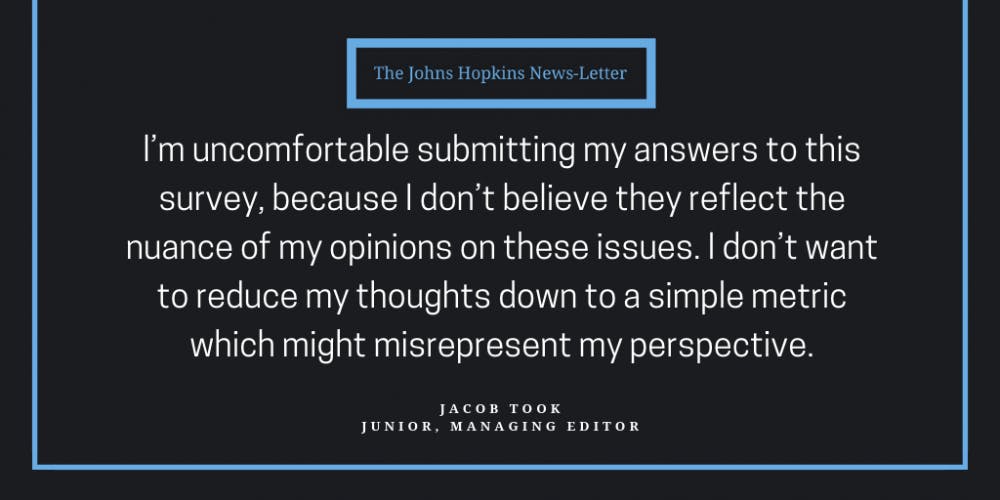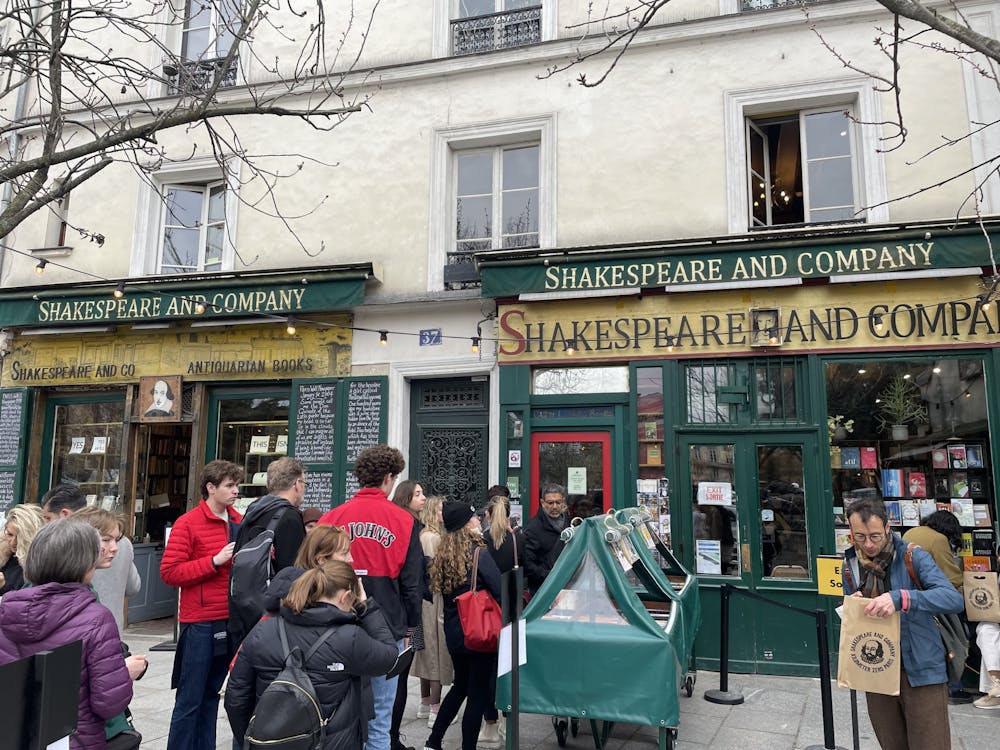Earlier this week, Vice Provost for Student Affairs Kevin Shollenberger sent out a survey to enrolled undergraduates as part of “continuing efforts to review and improve the Johns Hopkins experience.”
At a moment when conversations about issues on campus — a student center, contracts with the U.S. Immigrations and Customs Enforcement (ICE) or the pervasive private police force — are polarized and fraught with tension, this survey is an important way for the University to gauge where students fall. That’s why I would expect more thoughtfully-constructed questions that allow for more nuance, rather than reducing these conversations down to a simple scale.
Let’s start with the survey’s first page, which opens simply with the command: “Evaluate Johns Hopkins.” Challenge accepted. Part of the first section asks us to rate our satisfaction with a number of aspects of “the Hopkins experience” on a four-point scale. One of these is “feeling of security,” and another is literally just “campus police.”
Let’s break it down: If I respond that I’m “very satisfied” with “feeling of security,” will that show administrators that I am comfortable with the current security in place at Hopkins? If I appear to strongly affirm our current security, that could be read as logical support for increased policing.
Alternatively if I respond “very dissatisfied,” that seems to clearly indicate support for more policing. It could, however, mean that I am in fact not happy to have the existing security measures and would prefer an altogether different approach to public safety on campus.
“Campus police” is more or less the same: If I answer “very satisfied,” does that mean I’m satisfied with our current security force? Once again, can this be extrapolated into broad support for increased policing? But if I answer that I am “very unsatisfied” with “campus police,” does that denote support for the private police or dissatisfaction with the idea of a police force?
I’m “very dissatisfied” with the choice of “campus police” as opposed to “the proposed private police force.” This ambiguous wording leaves room to interpret my answer in whatever way administrators see fit. More importantly, when will the University learn that this conversation demands a level of nuance which cannot be expressed by a simple scale?
Here’s another good one: Later on, the survey asks me to rate my response to “administrators at Johns Hopkins are genuinely concerned about my welfare.” This time we get a five-point scale from “agree strongly” to “disagree strongly” with the neutral option of “neither agree nor disagree” — hooray for nuance!
Given the administration’s response to the pushback on the police force, criticism over the ICE contracts and even the ongoing Garland sit-in, I once again find myself unable to reduce my thoughts down to a single answer. On the one hand, I believe that administrators want us to be healthy and happy while we’re at Hopkins. University President Ronald J. Daniels has asked me personally whether I’m enjoying my time here, and I still believe that in that moment he genuinely cared about my answer.
That being said, the University’s actions show that they have priorities beyond the welfare of students. Why else would they be suppressing student voices in the discussion about a private police? Those who vocally oppose the police force aren’t doing so because of some abstract sense of social justice heroism. These are real students who really want to enjoy their time here and live happy, healthy lives, and they are really worried that mixing armed police with an insipid national trend of racial profiling and brutal practices will put them in direct peril.
Knowing this, it’s hard to agree that University administrators care about our welfare.
I’m not writing this to tell you my thoughts on these issues. I’m writing this to express my alarm that these questions are so reductive that they can be interpreted to have wildly different meanings.
I’m writing this to preempt the inevitable — that the University will reference the results of this survey going forward in conversations about the police force or the ICE contracts. I’m uncomfortable submitting my answers to this survey, because I don’t believe they reflect the nuance of my opinions on these issues. I don’t want to reduce my thoughts down to a simple metric which might misrepresent my perspective.
Going forward, the language in these surveys must be more clear to eliminate as much ambiguity as possible. Furthermore, every section of the survey must have a section to elaborate on the response or offer feedback. Offering one space at the end of the survey inviting me to “elaborate on any of the questions of the survey” is not enough.
After a year of turmoil around the police force, I’m stunned to see the University continue to try and reduce this conversation down to a few simple multiple-choice questions. This survey was a chance to give every student a chance to communicate with the administration. At the moment, though, I don’t trust the administration with my answers.
Jacob Took is a junior from Dallas, Texas majoring in Writing Seminars, English and Russian. He is a Managing Editor.





